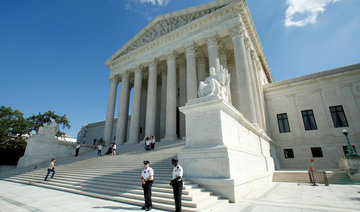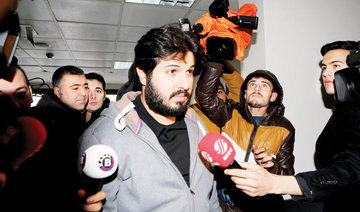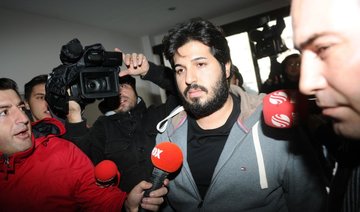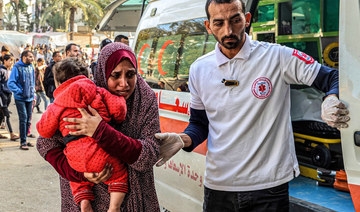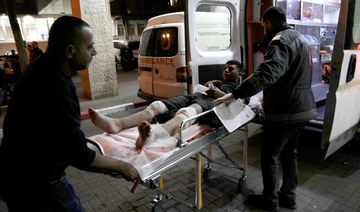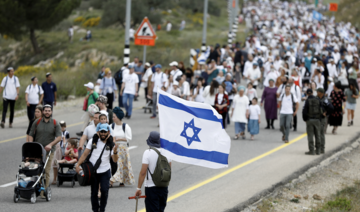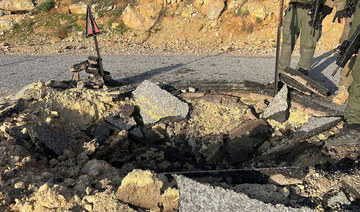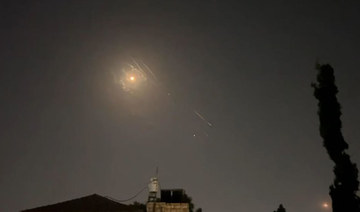ANKARA: Turkish President Recep Tayyip Erdogan on Tuesday condemned a US sanctions-busting case against a Turkish bank executive as a “political coup attempt” and a joint effort by the CIA and FBI to undermine Ankara.
A US jury last week convicted the executive of Turkey’s majority state-owned Halkbank of evading Iran sanctions, capping a trial that has strained relations between the NATO allies.
Erdogan, speaking to members of his ruling AK Party in the Parliament, said the CIA, the FBI and the network of the US-based cleric Turkey blames for a 2016 coup were together using the case to undermine Ankara.
“Those who could not succeed in the (military) coup attempt in Turkey on July 15, (2016) are now searching for a different attempt in our country,” he said.
Bloomberg quoted Deputy Prime Minister Recep Akdag as saying the evidence used in the court proceedings “was fabricated” by supporters of Fethullah Gulen.
According to the report in Bloomberg, there is concern that Atilla’s conviction will prompt US authorities to penalize Turkey or its banks — especially since the jury found that the scheme was devised by executives at the state-run bank, formally known as Turkiye Halk Bankasi AS.
“The US has given no indication of that so far. Bekir Bozdag, the Turkish government’s spokesman, has fueled concerns by repeatedly saying that the case is an attempt to cripple Turkey’s economy through the imposition of sanctions,” the report added.
Halkbank is Turkey’s biggest listed state bank, with assets of 280 billion liras ($74 billion), and its success is viewed by the government as a national cause. The bank’s traditional client base consists mainly of small businesses, and with its options for offshore financing hampered by the trial.
The US case against Atilla was based on the testimony of the gold trader Zarrab, who cooperated with US prosecutors and pleaded guilty to charges of leading a scheme to evade US sanctions against Iran.
In his testimony, Zarrab implicated top Turkish politicians.
The bank has denied any wrongdoing and said its transactions were in line with local and international regulations.
The court decision is unlikely to damage Erdogan or his government at home, said Wolfango Piccoli of Teneo Intelligence, a London-based consultancy.
“Domestically, I don’t believe it will make any difference at all...” Piccoli said. “I think it is much more important in terms of the bilateral relations with the United States. This is a relationship that has been difficult for some time.”
Less clear was the potential fall-out for the banking sector, with some analysts seeing the possibility that one or more Turkish lenders could be hit by fines over the case.
“The whole thing is really about what the consequences will be for the relationship between Turkey and the US,” said Paul Fage of TD Securities in London.
Turkey has said it will take any necessary measures to protect its banks from the potential impact of the case.
Erdogan calls US case against banker ‘political coup attempt’
Erdogan calls US case against banker ‘political coup attempt’

Denmark to close its Iraq embassy
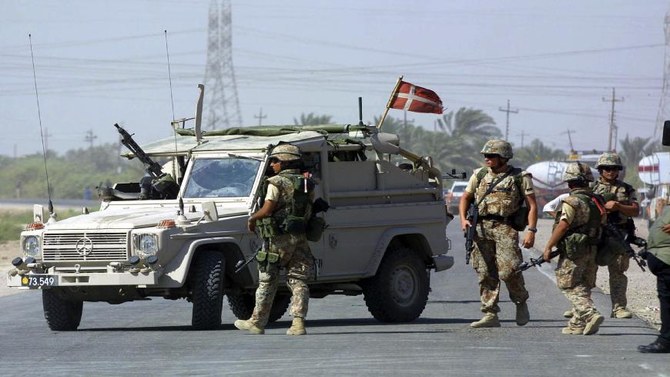
The diplomatic mission in Baghdad was formally opened in 2020 to support the Danish command over and contribution to the NATO Mission Iraq (NMI).
The majority of the Danish military contribution has since been withdrawn.
Egypt, UN coordinator stress need for smooth aid delivery to Gaza
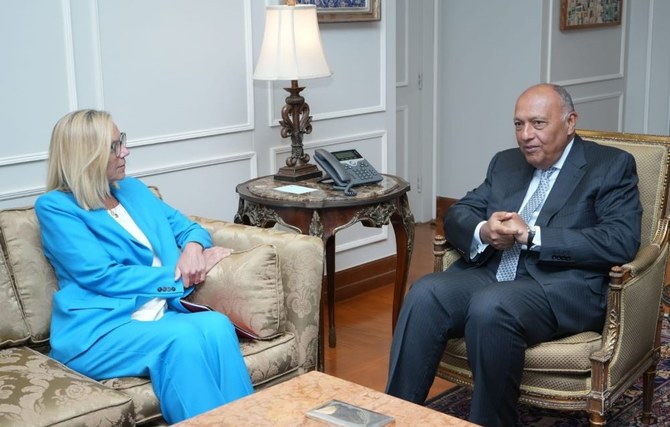
- Sameh Shoukry and Sigrid Kaag discussed the various facets of the humanitarian crisis in the besieged territory
- Kaag said she appreciated the pivotal role played by Egypt in containing the humanitarian repercussions of the crisis
CAIRO: Egypt’s Foreign Minister Sameh Shoukry and the UN’s coordinator for the Gaza Strip Sigrid Kaag on Tuesday discussed the various facets of the humanitarian crisis in the besieged territory, the volume and quality of aid entering it and the priorities regarding the type of aid.
The meeting took place at the Foreign Ministry’s headquarters in Cairo where the two sides reviewed the ongoing endeavors with various parties to expedite the launch of the UN mechanism as soon as possible.
They affirmed the inevitability of intensifying the volume of aid to meet the needs of the Palestinian people as well as providing the necessary protection for international relief personnel present in the Strip.
Shoukry reaffirmed the legal and humanitarian responsibility incumbent upon international parties to ensure the implementation of the provisions of Security Council Resolution 2720 and all other UN resolutions relevant to the situation in Gaza.
He stressed the necessity of dealing seriously and urgently with the humanitarian crisis in Gaza by reaching an immediate and permanent ceasefire, as well as sustaining aid access in a full, safe and intensive manner to all areas, the removal of impediments imposed by Israel in this regard and the opening of all land crossings to increase the flow of aid.
Kaag affirmed her keenness to continue coordination and consultation with Egypt to carry out her duties. She said she appreciated the pivotal role played by Egypt in containing the humanitarian repercussions of the crisis as well as the existing cooperation between the Egyptian Red Crescent, Egyptian civil society organizations and UN relief agencies to deliver aid.
Arab League condemns surge in West Bank settler attacks
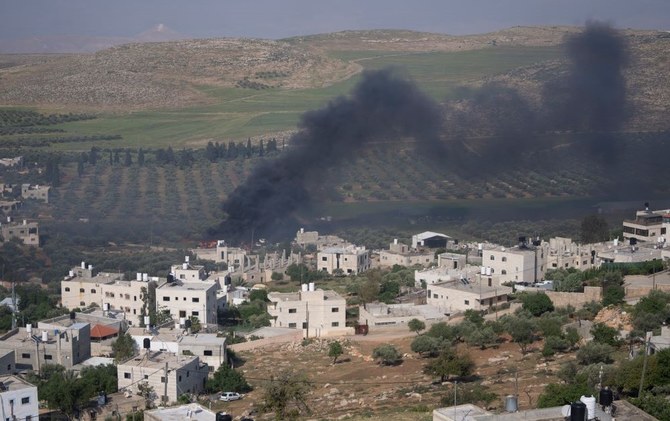
- Gamal Roshdy: Incidents of violent crimes, arson and property destruction perpetrated by armed settlers have seen a noticeable surge
- Tensions in the West Bank have been especially high since the outbreak of the Israel-Hamas war in the Gaza Strip on Oct. 7
CAIRO: The Arab League on Tuesday strongly denounced relentless attacks carried out by Israeli settlers on Palestinian cities and towns across the West Bank.
“These attacks, often perpetrated under the tacit approval and protection of Israeli authorities, are exacerbating a pervasive state of impunity and continued oppression of Palestinian lives and properties,” the league said in a statement.
Gamal Roshdy, the secretary-general’s spokesperson, said that while daily atrocities committed by Israeli forces in Gaza demand attention, they must not overshadow the escalating violence in the West Bank.
He added: “Incidents of violent crimes, arson and property destruction perpetrated by armed settlers have seen a noticeable surge, facilitated by a settler-led government that shields them from accountability.”
Roshdy warned that the imposition of sanctions by some countries on settlers, though a belated gesture, falls short of addressing the escalating crisis and safeguarding Palestinian civilians in the West Bank.
He called for action from the UN Security Council to end the “shameful cycle and the culture of impunity prevailing in the West Bank,” and to “hold these settlers accountable for their reprehensible crimes against the Palestinian people.”
Tensions in the West Bank have been especially high since the outbreak of the Israel-Hamas war in the Gaza Strip on Oct. 7.
On Friday, dozens of Israeli settlers stormed a Palestinian village in the Israeli-occupied West Bank, shooting at and burning houses and cars.
The Palestinian Foreign Ministry has strongly condemned the settler violations and crimes against Palestinians across the West Bank.
King Abdullah II: Jordan won’t become ‘theatre of war’ between Israel and Iran
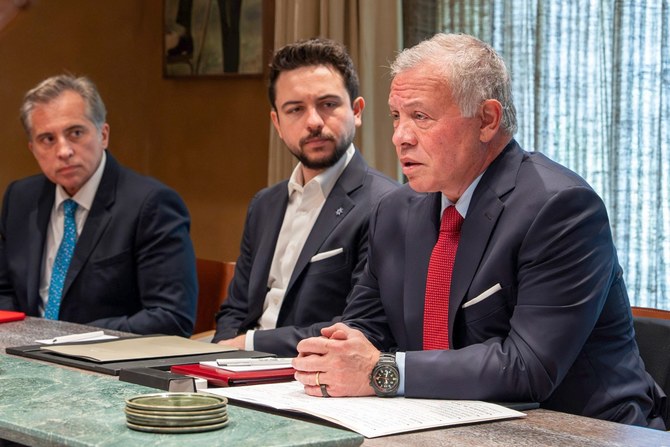
- King of Jordan reinforced the nation's commitment to upholding its security and sovereignty
- He said Jordan's aim was to safeguard its own sovereignty rather than defend Israel
DUBAI: Jordanian King Abdullah II said Tuesday that his country must not become ‘the theatre of a regional war’ after Jordan intercepted multiple missiles and drones when Iran attacked Israel at the weekend.
The king reinforced the nation's commitment to upholding its security and sovereignty above all other considerations. He stressed Jordan's aim was to safeguard its own sovereignty rather than defend Israel.
Last weekend, Jordan was among a group of nations that helped Israel shoot down missiles, rockets and attack drones launched by Iran and its allies at Israel.
Earlier on Tuesday, Jordan's Foreign Minister Ayman Safadi said the international community should stop Israeli Prime Minister Benjamin Netanyahu from "stealing" attention away from Gaza by escalating his confrontation with Iran.
In remarks during a press conference with his German counterpart in Berlin, Safadi said Iran had responded to the attack against its consulate and had announced that it did "did not want to escalate further".
"We are against escalating. Netanyahu wants to draw attention away from Gaza and focus on his confrontation with Iran," Safadi added.
Iran's weekend attack caused modest damage in Israel and wounded a 7-year-old girl. Most missiles and drones were shot down by Israel's Iron Dome defence system and with help from the US, Britain, France and Jordan.
Iran -- which labelled its attack an act of self-defence after a deadly Israeli strike on its Syria consulate -- warned Jordan it could be “the next target”, a military source was reported as saying by Iran's Fars news agency.
(with agencies)
Israel’s old Lebanese allies grapple with new Hezbollah threat
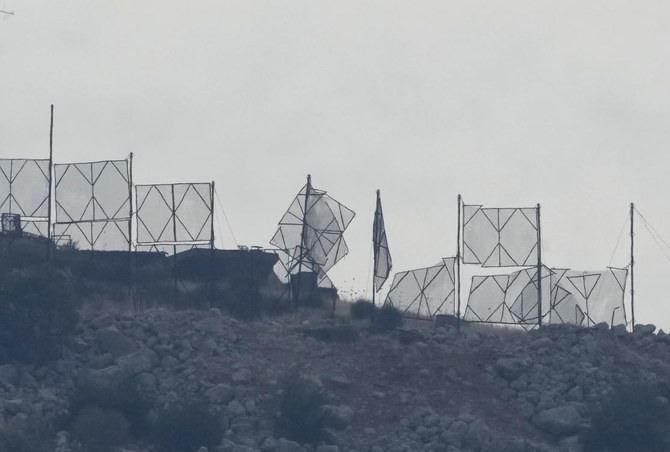
- The South Lebanon Army was a mostly Christian militia recruited by Israel when it occupied south Lebanon in the 1980s and 1990s
The looming threat of a war between Israel and Hezbollah in Lebanon is reviving painful memories for former Lebanese militiamen and their families who fled to Israel, their erstwhile ally, more than 20 years ago.
The South Lebanon Army was a mostly Christian militia recruited by Israel when it occupied south Lebanon in the 1980s and 1990s.
The Zadalnikim, as the SLA’s former members are known in Israel from the group’s Hebrew acronym, sought shelter south of the border in the aftermath of Israel’s sudden withdrawal from Lebanon in May 2000, fearing reprisals from Hezbollah, whom they had fought for years in a brutal and uncompromising conflict.
Iran-backed Hezbollah — a Hamas ally with a large arsenal of rockets and missiles — has exchanged fire with Israeli forces almost daily since Hamas attacked Israel on October 7 triggering war in Gaza.
In response, Israel has carried out strikes deeper and deeper into Lebanese territory, targeting several Hezbollah commanders.
A strip several kilometers (miles) wide on either side of the border has become a de facto war zone, emptied of its tens of thousands of civilian residents.
“They told us to prepare for two weeks in a hotel in Tiberias” in northern Israel, said Claude Ibrahim, one of Israel’s more prominent Lebanese collaborators.
“It’s already been six months. I hope it won’t last 24 years,” he told AFP, referring to his exile from Lebanon.
Ibrahim, a former right-hand man of the late SLA commander Antoine Lahad, was evacuated from the northern Israeli town of Kiryat Shmona, near the Lebanese border, in October when the entire city was emptied.
“It’s as if history repeated itself... generation after generation,” he said, referring to how the Zadalnikim had to flee their homeland after years spent moving from village to village during the Lebanese civil war of the 1970s and 1980s.
Of the 6,000 to 7,000 Lebanese who fled to Israel in May 2000, around 3,500 still live in Israel, according to the authorities. They are registered with the interior ministry as “Lebanese of Israel” and were granted citizenship in 2004.
Shortly after their arrival in Israel — where authorities only partly took responsibility for them — many moved on to Sweden, Germany or Canada. Others returned to Lebanon, where they were tried for collaboration with Israel.
All former SLA members in Israel have relatives in Lebanon, mostly in villages in the south, a few kilometers (miles) from the Israeli border.
Few agreed to be interviewed out of fear of reprisals against their families in Lebanon, whom they stay in touch with via third parties for the same reason.
Maryam Younnes, a 28-year-old communications student at Bar-Ilan University near Tel Aviv, was five when she arrived in Israel with her parents.
When her father, a former SLA officer, died a decade ago, they were able to bury him in their ancestral village of Debel, roughly 10 kilometers (six miles) as the crow flies from Ma’alot-Tarshiha, the northern Israeli town they moved to.
The rest of their family remained in Lebanon, in Debel and the capital Beirut.
With fears growing that the near-daily exchanges of fire across the border might escalate into a full-scale war, Younnes was worried about her relatives.
“I’m very concerned for my family, for my village (in Lebanon),” said Younnes, who sees herself as “half Lebanese, half Israeli.”
“I hope that there will be a way to protect them,” she said, if there is an all-out war with Hezbollah.
Ibrahim was equally worried, although he voiced hope that a new conflict with Israel would “finish off” his old enemy Hezbollah.
“The only solution is a big strike on Hezbollah so that it understands that there is no way forward but through peace,” he said.
Ibrahim said there was no reason Israel and Lebanon should not be at peace.
But Asher Kaufman, a history professor at Notre Dame University in Indiana who specializes in Lebanon and the wider Middle East, said attitudes in Israel had shifted significantly in the decades since the civil war and the cooperation between Lebanese Christian militias and the Israeli military.
The vision of an alliance between “Lebanese Christians and the Israelis, which was at the root of the 1982 invasion (of Lebanon by Israel) has completely collapsed.”
Israel has stopped “viewing Lebanon as the Switzerland of the Middle East,” a peaceful and prosperous country, and now sees it as “a violent quagmire it wants nothing to do with.”


